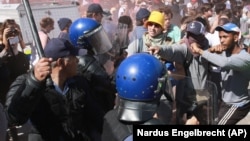For VOA Learning English, this is the Higher Education Report.
Thousands of protesters marched through London on Wednesday to express anger about the rising cost of higher education.
The UK joins a growing list of countries that saw angry crowds of students taking to the streets over the past year. South Africa and Chile both had large protests of the cost of higher education in the last few months.
A plan to cut government money that supports full-time university students is the reason for the London protests. This money, called maintenance grants, helps full-time higher education students with the cost of living. Students do not have to pay the money back to the government.
British Member of Parliament George Osborne announced in June that maintenance grants would no longer be available. Osborne said that starting in 2016, the government will offer maintenance loans instead. These loans will need to be paid back.
Cuts to supports for students will affect low and middle income students the most, critics say.
The problem of higher education costs for poorer people was also at the center of the South African demonstrations. The University of Witwatersrand in Johannesburg announced that it would increase fees by 10.5 percent in 2016. Student protests then caused the university to stop all activity on October 14.
Demonstrations spread to several other universities across the country as well as outside parliament. The protests quickly became the largest in the country since the end of Apartheid in 1994. Apartheid was the social system in South Africa that began in 1948. During the period of Apartheid, black people and people of other races did not have the same rights as white people.
South African President Jacob Zuma declared on October 23 there would be no increase to university fees. However, the protests still have not ended. Income inequality and racism are also issues protesters want the government to recognize.
The University of Witwatersrand recently released a study of these issues. The results of that study show 60 percent of the country's black African workers live in poverty.
Chile's protests throughout this year are part of a longer struggle as well. The Confederation of Chilean Student Federations, or CONFECH, is an organization that fights for change to the country's education system. CONFECH began organizing university students in 2011. Their goal was to get the government to improve the public education system.
Chilean President Michelle Bachelet's promises to change the education system helped her win the 2013 election. Bachelet signed a bill on Monday giving control of the entire public education system to the central government. This bill would share resources in all schools equally.
But, many of the protesters say the President has not done enough. Protesters include in their demands free university education for all people. Bachelet has promised free university education for 70 percent of the country's poorest people.
Demonstrations continue, though, as it is not clear how the country will pay for free higher education.
An important quality uniting these protests around the world is the use of social media. The National Campaign Against Fees and Cuts, or NCAFC, is a London-based organization that fights tuition fees and education cuts. NCAFC created the hashtag #GrantsNotDebt to spread information about Wednesday's protests over the Internet.
Organizers in South Africa used the hashtag #FeesMustFall.
Chilean protesters use Twitter and Facebook to share photos and stories of what is happening in the streets.
Violence has also been present at some of the protests. South African police used water cannon and stun grenades on protestors in the city of Pretoria. A property owner shot and killed two young men in the Chilean city of Valparaiso in May. The young men were hanging a sign on the side of the property owner's building.
Groups in all three countries continue working to make education cheaper and easier to access. The NCAFC has plans for another march on November 17. British Labor Party member John McDonnell voiced his concerns at the march on Wednesday.
"Education is a gift from one generation to another," he told marchers. "It is not a commodity to be bought or sold."
Ralph Mathekga studies politics in South Africa. He told VOA
that these protests could mean major changes in the African National Congress, or ANC. The ANC will have local elections next year. Mathekga believes that the protests show a change in the way people will vote.
"What we have seen is actually the [growing] power of the middle class in South Africa," Mathekga said. "And the question is: how far is this going to go?"
The cost of higher education is a major issue in the United States as well. The Institute for College Access and Success is an organization that studies the cost of education. The organization released a report on Tuesday about debt from student loans in the US. The report shows that 69 percent of higher education students used loans to pay for school in 2014. The average loan debt among those students is $28,950.
Next week we will look at ways some students avoid debt and find cheaper ways to get an education.
I'm Pete Musto. And I'm Jill Robbins.
Now it's your turn. How does your government support people who want to attend college or university? Do you think higher education should be free? Let us know in the comments section below, or on our Facebook page.
Pete Musto reported and wrote this story for VOA Learning English. Kathleen Struck was the editor. ______________________________________________________________
Words in This Story
income – n. money that is earned from work, investments or business
inequality – n. an unfair situation in which some people have more rights or better opportunities than other people
racism – n. poor treatment of or violence against people because of their race
tuition – n. money that is paid to a school for the right to study there
hashtag – n. a word or phrase beginning with a hash or pound sign (#) and used to identify messages on a specific topic
cannon – n. a large gun
stun grenade(s) – an object that is used to cause a sudden, loud, and violent release of energy, making a person unable to move or think clearly, without injury
cheaper - adj. costing less money
commodity – n. something that is bought and sold








